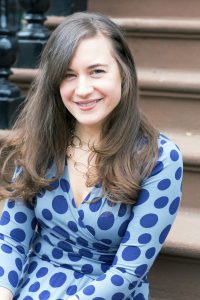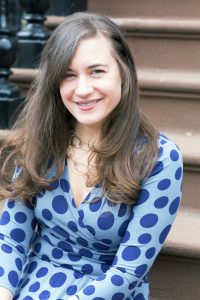Hebrew School, Reimagined
This month’s post is by Rachel Weinstein White, Founder and Executive Director of Fig Tree, an NYC-based independent Jewish education program.

In 2014, I was looking for an innovative, meaningful, diverse Hebrew School and Jewish community for my family, and I couldn’t find anything that resonated with our flavor of Judaism. So, I decided to create it! A year later, Fig Tree- the Jewish education program I founded and now run- was born. We now have well over 250 students- the majority of whom identify as interfaith, interracial and/ or “culturally” Jewish [aka “Covenantal Jews,” to use Rabbi Sid’s term]. Our program strives to meet the real needs of 21st century families while remaining rooted in tradition and text in various ways that are consistent with the four propositions from the essay.
Wisdom/ Chochma
Rabbi Sid writes that Jewish institutions need to rethink the ways they transmit Jewish heritage, and I couldn’t agree more. Our students and families seek richly meaningful Jewish learning- something that isn’t rote tefillah, but isn’t fluffy crafts, either. I absolutely loved his emphasis on the need for “globalization” in Jewish learning. At Fig Tree, we infuse Jewish teachings with those of the other cultures, ethnicities and religions throughout the year. B’nai Mitzvah students look at coming of age ceremonies throughout history and around the world. We prioritize incorporation of primary sources (text, music, art) developed by People of Color, past and present. We compare and contrast creation myths across cultures. These resources don’t just complement our Jewish learning; they elevate it.
Social Justice/ Tzedek
Social justice is at the root of all of our programming and curricula. We teach Torah, ritual, culture, history, holidays, and tefillah– all through the lens of tzedek. Aligning Judaism with “doing good” is an incredibly effective way to instill pride and encourage growth of Jewish identity in our kids. Our B-Mitzvah program is centered around social justice and service work as a fundamentally Jewish act. In addition to weekly classes in which students learn about the modern plagues of social injustice and what Jewish text has to say about them, our B-Mitzvah cohort participates in monthly service learning projects throughout NYC. Fig Tree also organizes service projects for the families of students in younger grades throughout the year. I’m grateful to be able to leverage a wonderful partnership with Repair the World, one of the many national Jewish initiatives focused on social justice mentioned in the Schwarz essay.
Community/ Kehillah
The Fig Tree community is made up of students and their busy parents, many of whom have very little time for kehillah. In fact, I’d argue that many American parents (including myself; I have three elementary-aged kids) are drowning in organized community. Between school, clubs, classes, sports and camps- each of which comes with its own commitments and expectations- it’s no wonder parents of growing kids are becoming less and less engaged in Jewish community.
One of the ways we attempt to thwart “death by community” for hectic parents is that we very clearly communicate that participation is optional. For everything. Families register students for our classes, and then they may optionally attend our community events: holiday celebrations, Shabbat potlucks, family service learning. But we set the bar low and aim for radical inclusivity. Attendance isn’t required, everything is free, and we never ask for volunteers or committees. Rather than striving to build (yet another) community, our goal is simply to create opportunities for our families to gather Jewishly. What I’ve found over the years is that a core group of families faithfully attend all of our events, while others just dabble- and at least half of our families don’t come to anything. And that’s completely OK. It’s actually great. It allows the families who want community to get it (and by consistently showing up for one another, they organically build their own chosen sub-community)- and the ones who don’t, still feel perfectly satisfied with the arrangement. I see this as a hybrid of Rabbi Sid’s synagogue-center and synagogue-community approaches to community-making. We coordinate and host low-commitment gatherings, and the parents who want to take the reins and help build community from those experiences, do.
Lives of Sacred Purpose/ Kedusha
Though this is not our core focus, Fig Tree offers multiple opportunities for families and students to make meaning and mark Jewish time together (Shabbat potlucks, Havdalah, holidays). Classes include spiritual reflection and prayer. We also frequently partner with independent rabbis, minyanim, and various “synagogues without walls” to give families access to various flavors of meaningful communal prayer.
Support and Representation for Jewish Families of Color
I’d like to close by identifying one area that was not included in Rabbi Schwarz’ four propositions: listening to and supporting Jewish families of Color. Jews of Color make up an estimated 10-20% of the American Jewish community, yet are significantly underrepresented in mainstream Jewish institutions. Lack of representation can feel isolating- both for us as parents, and for our children.
Gathering as a group is one way to combat that isolation. At Fig Tree, I created a Jewish Families of Color affinity group that functions as a safe space for families to share ideas and address questions/ concerns that are particularly relevant to Jewish families of Color. We host seminars/workshops, and we gather for Shabbat in a smaller group. My hope is that this group is a resource for families who need it, and will help foster diversity and inclusion within Fig Tree and beyond.
[themify_hr color=”light-gray” width=”100%”]
Rachel Weinstein White is the Founder and Executive Director of Fig Tree, an NYC-based independent Jewish education program for kids from interfaith, interracial and/ or secular backgrounds- or simply families seeking a Hebrew School alternative. Rachel lives in Bedford Stuyvesant, Brooklyn with her partner, three sons, three chickens, and two cats.


